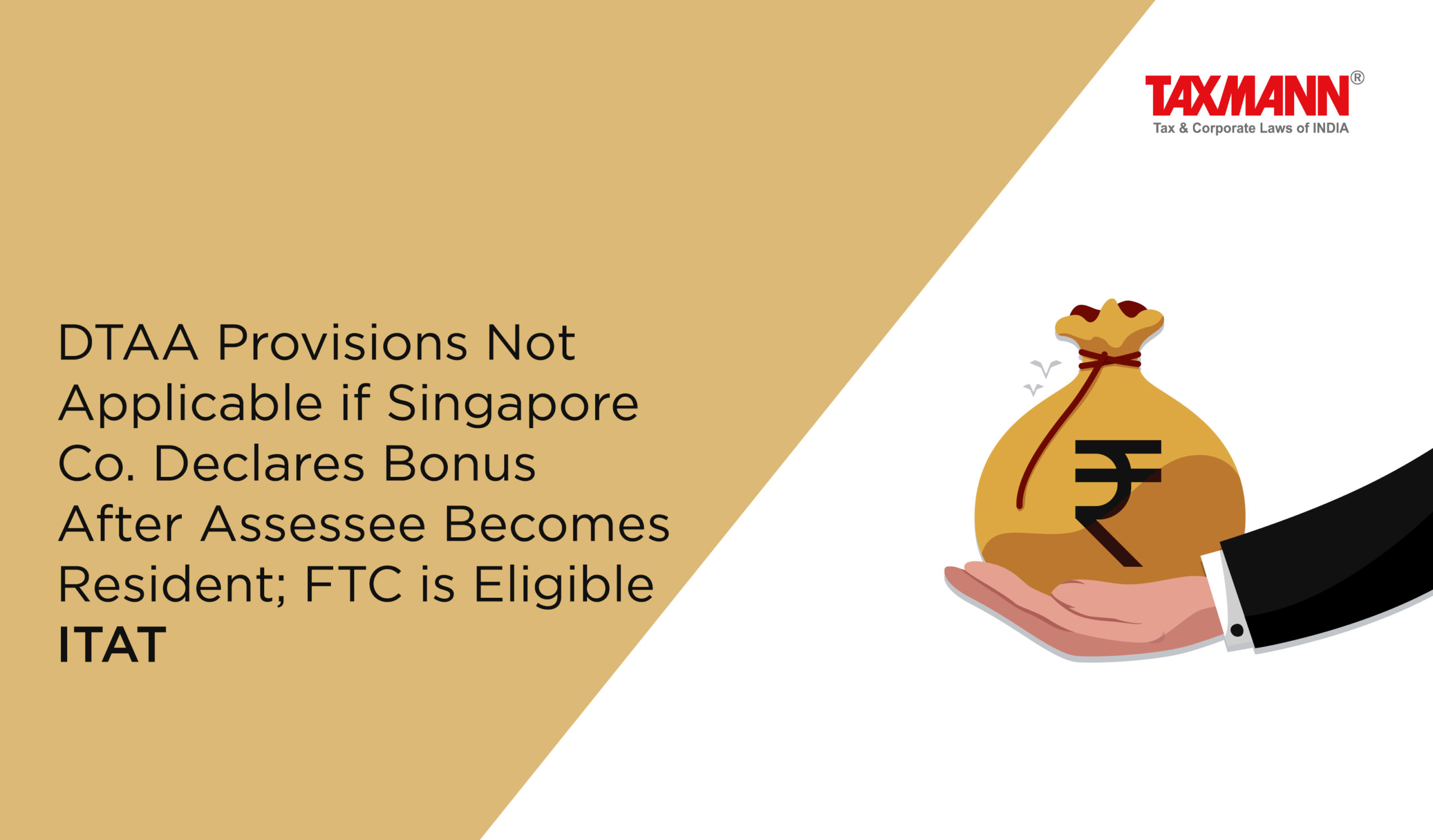DTAA Provisions Not Applicable if Singapore Co. Declares Bonus After Assessee Becomes Resident; FTC is Eligible | ITAT
- Blog|News|International Tax|
- 2 Min Read
- By Taxmann
- |
- Last Updated on 16 August, 2023

Case Details: Souvik Mukherjee v. ITO - [2023] 153 taxmann.com 58 (Delhi-Trib.)
Judiciary and Counsel Details
-
- Kul Bharat, Judicial Member & M. Balaganesh, Accountant Member
- Dr Rakesh Gupta, Somit Aggarwal & Deepesh Garg, Advs. for the Appellant.
- Sanjay Kumar, Sr. DR for the Respondent.
Facts of the Case
Assessee was a resident individual and had filed his return of income for the assessment year 2012-13 on 23-7-2012. He had declared income under the head income from salary, house property, and other sources. During scrutiny assessment proceedings, the assessee claimed relief under section 90 regarding bonus received in June 2011 from his previous employer in Singapore.
However, the Assessing Officer (AO) disallowed said claim. On appeal, the CIT(A) upheld the order of AO. Aggreived-assessee filed the instant appeal before the Tribunal.
ITAT Held
The Delhi Tribunal held that it was a fact that the assessee included the bonus in his return of income, and tax was deducted by the Indian employer. It was found from Article 15 of the Double Taxation Avoidance Agreement entered into between India and Singapore, salary, wages and other similar remuneration derived by a resident of the contracting state in respect of employment shall be taxable only in that State unless the employment is exercised in other contracting state.
Admittedly, the assessee was a non-resident when he was working at Singapore Company. In pursuance of said employment, the assessee was given bonus in June 2011. It was not in dispute that during the period for which the bonus was received, the assessee served only in Singapore and not in India.
On perusal of the provisions of section 5(1), the said bonus income would have to be construed as income accruing or arising to him in India, and it is also received during the year by the assessee. Hence, the bonus received by the assessee, being a resident, would be taxable for the year under consideration in India.
However, in terms of section 90, the entire taxes paid by the assessee in Singapore for the same salary and bonus component would be eligible for tax credit for the assessee. Thus, AO was directed to allow the foreign tax credit in full in respect of tax paid in Singapore for the salary and bonus income.
Disclaimer: The content/information published on the website is only for general information of the user and shall not be construed as legal advice. While the Taxmann has exercised reasonable efforts to ensure the veracity of information/content published, Taxmann shall be under no liability in any manner whatsoever for incorrect information, if any.

Taxmann Publications has a dedicated in-house Research & Editorial Team. This team consists of a team of Chartered Accountants, Company Secretaries, and Lawyers. This team works under the guidance and supervision of editor-in-chief Mr Rakesh Bhargava.
The Research and Editorial Team is responsible for developing reliable and accurate content for the readers. The team follows the six-sigma approach to achieve the benchmark of zero error in its publications and research platforms. The team ensures that the following publication guidelines are thoroughly followed while developing the content:
- The statutory material is obtained only from the authorized and reliable sources
- All the latest developments in the judicial and legislative fields are covered
- Prepare the analytical write-ups on current, controversial, and important issues to help the readers to understand the concept and its implications
- Every content published by Taxmann is complete, accurate and lucid
- All evidence-based statements are supported with proper reference to Section, Circular No., Notification No. or citations
- The golden rules of grammar, style and consistency are thoroughly followed
- Font and size that’s easy to read and remain consistent across all imprint and digital publications are applied



 CA | CS | CMA
CA | CS | CMA
